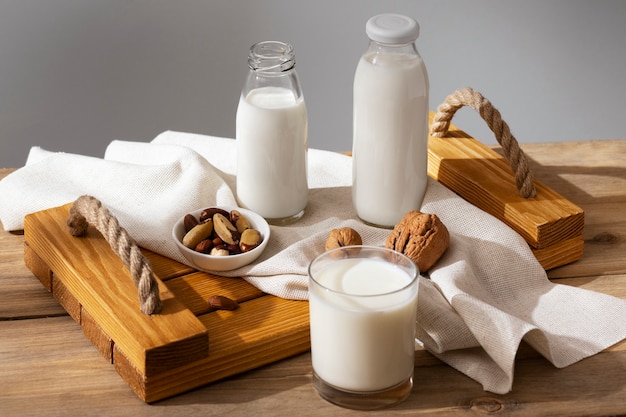
Today, many people are swapping dairy for today’s popular plant-based milk varieties. There’s something for everyone, regardless you’re vegan, lactose intolerant, or allergic to specifics like coconuts, soy, or tree nuts. In fact, you’ve probably already noticed these dairy-free alternatives cropping up in your local supermarket.
Typically, store-bought varieties of plant-based milks like those from legumes, seeds, and nuts, come with diverse levels of fibers and proteins. They normally contain 1-4g per cup, as most ingredients are mainly water-based. This results in about 100 fewer calories than traditional cow’s milk, making it a healthier option for many. No wonder over half the adults globally are leaning toward these milk alternatives!
But with all the variety out there, you might be wondering, which plant-based milk works best for you? Well, let’s dive into a few options:
1. Oat Milk: Oaty and creamy, it’s made by soaking and blending whole oats in water. Rich in fiber and boosted with vitamins and minerals for healthy eyes and skin, it’s a popular choice. However, if you’re gluten-intolerant, it’s best to skip this one.
2. Soy Milk: Produced by soaking, grinding, and boiling soybeans, it’s rich in all essential amino acids. It’s also observed to reduce bad cholesterol and blood pressure. Hold off, though, if you’ve got a soy allergy.
3. Coconut Milk: Don’t confuse this for the canned cooking variety. This milk-substitute is made by blending grated coconut in hot water. Sweet and creamy, it’s perfect for coffee, but lacks solid fats and medium-chain triglycerides.
4. Almond Milk: It’s low in saturated fat and packed with unsaturated fats to keep your weight in check. With less protein and calories, it’s often supplemented with proteins like beans and fish for fulfilling daily nutritional requirements. Plus, it comes in an array of flavors.
5. Hemp Milk: Made of hemp seeds and water, it’s a nutritionist’s darling due to a high content of calcium, Vitamin D, and magnesium. It does lack enough fiber and can taste too nutty for some people.
6. Cashew Milk: Creamiest of all plant milks. It is filled with Vitamin K and healthy fats but isn’t the richest in protein.
7. Quinoa Milk: Delivering the highest protein and fiber among grain varieties, it’s gluten-free and great with cereal.
8. Pea Milk: This unusual choice is eco-friendly, high in proteins and has half the saturated fat and 50% more calcium than dairy milk.
9. Flax Milk: Made by combining flaxseed oil with water, it’s rich in omega-3 and allergy-safe, but it lacks protein and good flavor.
We hope this breakdown helps you better understand and choose the plant-based milk options out there. Next time you’re shopping, give one a try and see the positive changes it can bring to your lifestyle. Also, we’d love to get your take on this. Are you into plant-based milk or still favoring cow’s milk? Do share your experiences!
Author’s Note:
Archie, a former builder with over 40 years of experience, is keeping active during his retirement by sharing his knowledge on mykitchenadvisor.com blog. From detailed tool reviews to useful advice, you’ll find a variety of valuable content backed by Archie’s hands-on expertise.


